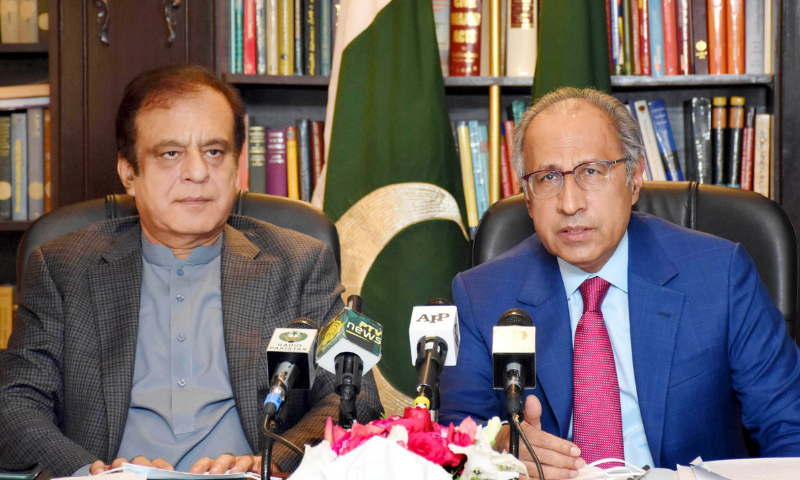• Staff mission will arrive in a few weeks, according to PM’s aide
• Faraz says no shortage of wheat, prices on the decline
ISLAMABAD: Claiming “positive news on economic front from all sides”, Adviser to the Prime Minister on Finance and Revenue Dr Abdul Hafeez Shaikh said on Tuesday a staff mission of the International Monetary Fund (IMF) would be arriving here in a few weeks for a shared understanding on tax reforms, higher collections and improvements in power sector.
Speaking at a news conference with Information Minister Shibli Faraz soon after a meeting of the federal cabinet, he said the IMF mission would come in a few weeks to give a formal structure to ongoing discussions with it and then the programme would be fully on track.
Dr Shaikh said Pakistan had very good relations with the IMF for the basic reason that all matters were progressing strictly the way these were committed, including better tax collection, strong reduction in government expenditures and paying off debts in a better way.
As a result, he said, the government availed certain relaxations that were not part of the original agreement in order to give incentives to the construction sector and tax discounts to businesses to avoid contraction in economy.
The IMF was fully cooperating with Pakistan on all these matters and was quick to provide an additional $1.4 billion to fight impact of Covid-19. He said the two sides had a basic understanding on all matters that now required shared understanding on two counts over the remaining period.
The two issues are how to move forward on improving the tax system and increasing collections. This is in the interest of all, otherwise the government would not be able to come up to the expectations of people.
The two sides also have to agree on how to improve the electricity system. He said a lot of hard work was being put in to bring about improvements in this area and the prime minister was himself showing leadership in this respect.
The past contracts were being adjusted and energy-fuel mix was being improved to shift towards solar, wind and hydropower resources.
The finance adviser said the economy was picking up as evident from both the external and internal indicators. “Good news is pouring in from all four sides and we need to protect it from coronavirus and build on it,” he said.
Mr Faraz said that “all basic economic indicators have moved in the right direction over the past one month and there is a feel-good factor in the market as evident from the stock market, foreign direct investment and large-scale manufacturing (LSM) data”.
He said there was no shortage of wheat anywhere in the country and its prices were now on a decline. He said wheat stocks now stood at 4.2 million tonnes and were being ramped up with 1.9m tonnes of wheat currently on the way, putting total availability at about 6.1m tonnes.
Mr Faraz said the next season would start with a surplus wheat stock in April when new produce would start coming in.
Dr Shaikh said that in four months of the current year, LSM had witnessed around 5 per cent growth after a long time, with strong support from cement, automobiles and fertilisers. He said exports were increasing as the textile sector had received good export orders. Also, the currency had stabilised and its value was improving while foreign exchange reserves increased to $13bn.
On the fiscal side, he said the FBR had collected Rs1,340bn in four months, up 4pc despite Covid-19 impact and in fact higher than the target for the period. In addition, the FBR cleared Rs128bn refunds in four months on top of Rs250bn refunds last year.
He said the government had reduced its expenditures and there was no borrowing from the State Bank of Pakistan. No supplementary grant outside the budget had been issued.
Dr Shaikh repeated his stance that the government inherited a huge $20bn current account deficit which was successfully brought down to $3bn last year and had turned surplus of $792m this year.
The adviser said that unlike the past the government’s income was more than its expenditures due to which it was not borrowing from the central bank and had in fact repaid Rs5 trillion of past loans and interest since it came to power. He said the government had achieved primary balance and as a result government’s debt stood unchanged at Rs36.4tr between July 1 and October 31 this year.
He, however, agreed that because of debt servicing of the past debts the country had to continue with a budget deficit. This was a clear proof that the government had maintained fiscal discipline.
He said the basic objective of the government efforts was to increase economic activity, create jobs and provide maximum relief to the people.
Dr Shaikh said the profitability of top 100 companies had gone up by 36pc, stock market was proving to be one of the world’s most attractive place for world investors.
He agreed that inflation remained a major challenge for the government which was trying to control the prices of commodities, especially wheat and sugar.
He said the government had to import wheat to meet shortage in the country but now the stock situation was completely under control as there was no shortage of any grain at this time.
He said the government had decided to increase the beneficiaries of ‘Ehsaas’ programme from the current 4.5m to 7m to whom the government would pay cash on permanent basis.
Published in Dawn, November 18th, 2020















































